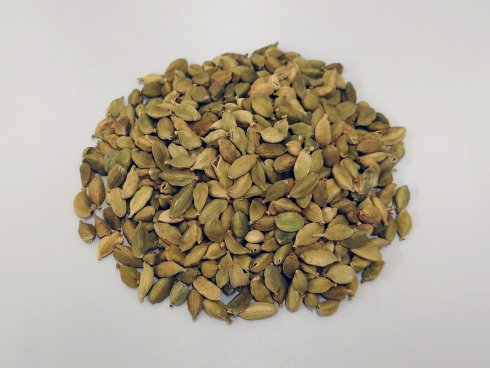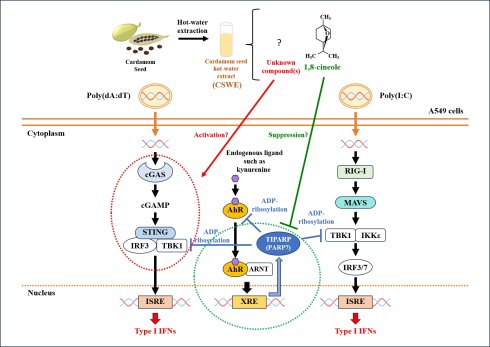Could Cardamom Seeds be a Potential Source of Antiviral Treatment?
- Share
- Tweet
- Send to email
Image title: Antiviral effect of cardamom seed extract
Image caption: The antiviral effects of cardamom seed (Elettaria cardamomum) extract through enhanced type I interferon production were revealed in this study.
Image credit: Abdullah Al Sufian Shuvo from Shinshu University, Japan
License type: Original content
Usage restrictions: Cannot be reused without permission.
Researchers show that cardamom seed extract can enhance the production of antiviral proteins called type I interferons
Plant-based materials have traditionally been used to treat a variety of viral infections. Now, researchers have found that cardamom seed extract, as well as its main bioactive ingredient, 1,8-cineole, can have potent antiviral effects through its ability to enhance the production of antiviral molecules known as type I interferons via nucleic acid ‘sensors’ inside cells.
Plant-based treatments have traditionally been used to treat a wide range of diseases, including viral infections. Medicinal plants and herbs have been a rich source of ‘bioactive’ compounds (i.e. compounds that have a biological effect), which have been used by pharmaceutical companies in antiviral products. These compounds can interfere with different viruses at various stages of their life cycle and modulate the body’s immune response to viral infection.
Image title: Type I interferon-enhancing effect of cardamom seed extract
Image caption: Cardamom seed extract, as well as its main bioactive ingredient, 1,8-cineole, enhances antiviral type I interferon production via intracellular nucleic acid sensors in cells targeted by viral infection.
Image credit: Abdullah Al Sufian Shuvo from Shinshu University, Japan
License type: Original content
Usage restrictions: Cannot be reused without permission.
Recently, a study published in Volume 14, Issue 15 of the journal Foods on August 6, 2025, led by Mr. Abdullah Al Sufian Shuvo, who is completing his doctorate from the Graduate School of Medicine, Science and Technology, Shinshu University, Japan, along with his coauthors Masahiro Kassai from S&B Foods Inc. and Dr. Takeshi Kawahara from Shinshu University. They studied one such natural ingredient—the humble cardamom seed, from Elettaria cardamomum, or the cardamom plant. Though it is primarily known as a spice, these researchers found that cardamom seed hot water extract can actually have potent antiviral benefits!
For starters, it might be wondered what inspired the authors to conduct this study, and if it was in any way influenced by the COVID-19 pandemic. Dr. Kawahara elaborates, “We have been researching food ingredients that can prevent viral infections in our daily life since before the emergence of the novel coronavirus. The pandemic has increased society's focus on the antiviral properties of food, which has led to more opportunities for us to engage in this research.”
In a previous study, the authors had found that cardamom seed extract had a preventative effect on influenza virus infection. Continuing this line of questioning, in this study, they conducted experiments on human lung cells known as A549 cells, treated them with cardamom seed extract, and then mimicked the process of viral infection in these cells—all in order to better understand the effect of cardamom seed extract on the production of antiviral molecules.
More specifically, they found that cardamom seed extract, as well as its major bioactive ingredient, a compound called 1,8-cineole, was capable of activating intracellular nucleic acid sensors, which are sensors inside a cell that can recognize virus-derived DNA and RNA molecules. These sensors can then induce the production of various molecules called cytokines, which act against viruses at different stages of infection.
In this particular case, treatment with cardamom seed extract or 1,8-cineole enhanced the production of a certain type of cytokine known as type I interferons, which play a crucial role in the body’s defense against viral infections, and this increase was mediated by the intracellular nucleic acid sensors.
Given these results, the authors expressed a strong interest in the potential medical applications of their findings. “Cardamom has historically been widely used as a spice with medicinal properties, but based on these findings, it is expected that it can be utilized as an antiviral material to prevent a wide range of viral infections,” explains Dr. Kawahara. He adds, “We hope that this research will provide a new perspective on the antiviral properties of food and create an opportunity to focus attention on a wider range of food ingredients that can help prevent viral infections in daily life.”
|
Reference |
||
|
Title of original paper: |
Type I Interferon-Enhancing Effect of Cardamom Seed Extract via Intracellular Nucleic Acid Sensor Regulation |
|
|
Journal: |
Foods |
|
|
DOI: |
10.3390/foods14152744 | |







